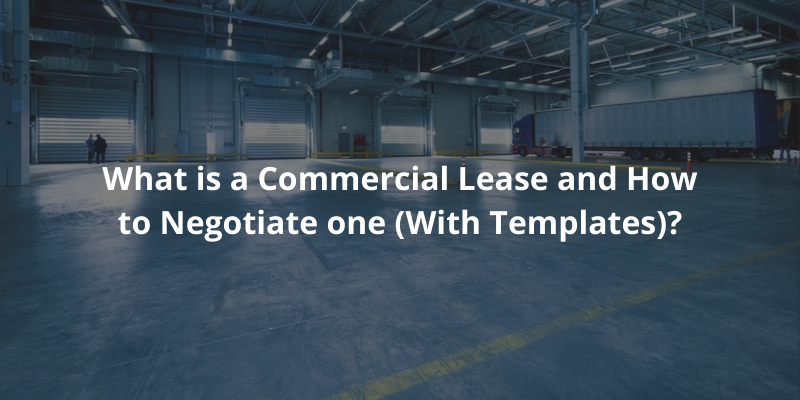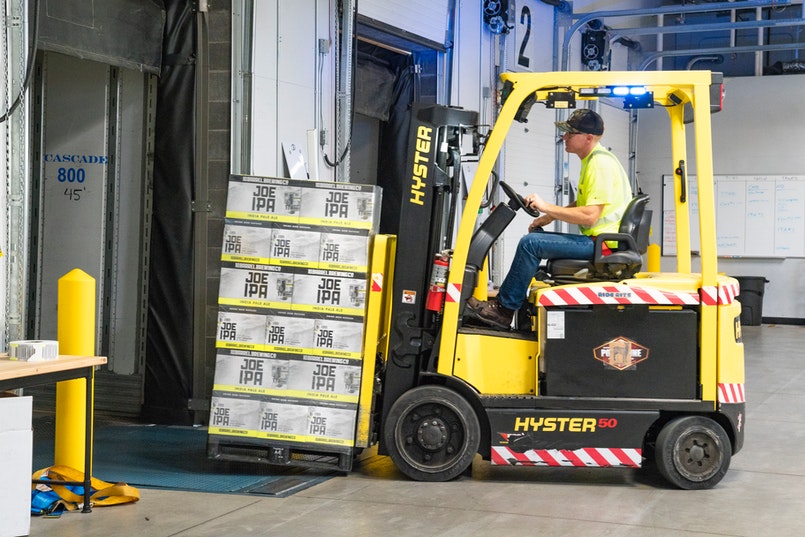Negotiating a Commercial Lease: A Complete Guide
7 Dec 2023
7 May 2021
min read

Businesses need commercial property to generate profit through the sale of goods or services. However, for businesses to rent that property, they need to sign a commercial lease agreement. A commercial lease is a legally binding contract made between the company (the ‘tenant’) and the commercial landlord. Since commercial leases are different from residential leases, it is important to understand how to negotiate such a contract such that you do not get into an undesirable lease, and that the agreed terms between the landlord and tenant are reflected on the final lease.
Here is everything you need to know about commercial leasing.

How does a Commercial Lease differ from a Residential Lease?
Commercial and residential leases are governed by different sets of rules.
In most jurisdictions, residential leases receive a higher level of protection than commercial leases. This is because to secure a commercial lease and confirm the lease term(s), prospective tenants must go through rounds of negotiation. In contrast, the average consumer signing a residential lease does not. As such, residential leases offer additional protection for security deposits, and rules for residential leases protect the tenant’s privacy. Commercial leases are also typically more flexible, which will help ensure that the commercial spaces (e.g. office space)in question are fit for the specific purposes they are rented for.
What are the essential elements of a commercial lease?
When negotiating a commercial lease with the commercial spaces' landlord, it is crucial to keep in mind that the essential elements for creating a commercial lease are more demanding than creating a mere contract. Below are the essential elements of this type of lease.
The Parties
It seems obvious enough that the commercial lease should specify who the landlord and the tenant are. However, it cannot be emphasised enough that the legal names of the parties are correct and that it is clear who is involved in the lease – as companies can be structured in complex ways.
For example, you may be negotiating with a subsidiary company instead of a parent company, meaning the liabilities and the remedies would be limited. In these circumstances, companies would have to conduct due diligence to ensure that all identities of the parties are legitimate and that they are properly compensated if things do not work out under the lease.

The subject
This is the clause that details the location of the property or space that the tenant will take up. Generally, providing the address of the property will be sufficient – subject to the qualification that the land itself must be suitable for the purposes that it is rented for. For example, it may not be possible to rent a piece of land for commercial activities if that land is in a residential area. Moreover, what constitutes part of the property may be a question to consider. For example – do air-conditioners constitute property? Some facilities might be essential for the purposes that it is rented for, but may not be considered, in legal terms, as part of the property. This should be clarified in the lease.
Rent
This clause will detail the arrangements for the rent payment. Typically, a sum of payment would be payable at the end of the month for the entire duration of the lease. However, this is subject to the market rate which parties often use to account for market volatilities. Some leases also refer to interest ‘caps and floors’ to protect the landlord and tenant’s interests.
Duration
Commercial leases are typically longer than residential leases as businesses tend to look for more permanent arrangements. It is quite common for tenants and landlords to agree on a fixed lease for a year, with an option to renew the lease for the following year. In some jurisdictions, like Hong Kong, merely stating the duration of the lease is not sufficient for creating a lease – for the contract to be valid, the parties must also agree on the commencement date of the lease.
What else should you negotiate for?
Besides the core legal requirements we mentioned above, parties should consider negotiating certain terms of the lease to ensure that they fit with one another. Here are some of those terms that should be considered while negotiating a commercial lease.
Repairing Obligation
Maintaining the property is a top concern for both tenants and landlords. The question of who bears the obligation to repair the property – the landlord or the tenant – should be made clear to avoid conflict.
In a full repairing and insuring (“FRI”) lease, the tenant is made entirely responsible for all repairs and for payment of the insurance premium. On the other hand, in an Internal Repairing Insuring Leasing (“IRL”), a tenant is only responsible for internal decorations and maintenance of the building and not the exterior of the building, such as the gates, and walls, windows. Moreover, a landlord may choose to maintain the building's common areas to ensure the maintenance of the building is coherent. The nature of the repairment obligation for tenants and landlords is therefore quite circumstantial. Parties should negotiate this term before entering a lease.

Rent Review Clause
As mentioned, rent under commercial leases tends not to be fixed as the lease usually runs for a longer period – making it difficult to project fixed rent from the beginning of the lease. Instead, rent is reviewable yearly to allow for adjustment according to the market rate.
Many leases provide references to the retail price index as a measurement to calculate the market rate of rent. If a lease contains a rent review clause, it should also provide the date of when the rent review will take place. Some landlords might opt for ‘upwards only’ rent review clauses, which means that if the rent assessment values the rent to be lower than the current level, the rent will remain the same. However, the assessment reflects that the rent needs to be adjusted to a higher rate. It will propose a higher rent as calculated. A balanced approach will allow for an upward downward rent review with a price cap and price floor to protect the interests of both tenants and landlords.
You can find a sample rent review template for use here.
Termination Clause
The termination clause will set out the circumstances in which either party can bring an early end to the lease. The lease should specify the minimum period to notice that the lease will come too early termination. This gives both the tenant and landlord time to find a replacement.
However, not all leases terminate amicably. Leases may be terminated due to unforeseen circumstances. A classic example would be a ‘material breach of contract’. The word ‘material’ is used to indicate the severity of the breach – although what constitutes ‘severe’ varies case by case. In English contract law, for example, a ‘material breach’ means that the contract-breaching conduct goes to the root of the contract. However, parties may be able to decide upon certain conduct that will amount to a ‘material' breach of contract to provide more certainty. A typical example of a material breach would be where a tenant operates illegal activities on the premises, resulting in the landlord being entitled to bring the lease to an end immediately. The tenant may still have an obligation to pay the remaining rent under the lease.
A landlord will often stipulate that they can terminate the lease if the tenant damages the property. A landlord may also terminate the lease at any time, but it is very likely that the landlord would have to provide prior notice and pay proper compensation to the tenant.
Facilities of the property
Some tenants require special facilities to run their kind of business. For example, if a tenant wants to run a restaurant business, they would need a kitchen space, which would likely require a ventilator system. If the tenant wants to run a jewelry business, they might require a security system. A ballroom tenant might require air-conditioners as part of the lease. The tenants, therefore, need to negotiate these terms before signing the lease or will not be guaranteed their essential needs. If the landlord is unable to provide, the tenant may have to negotiate to make certain improvements or modifications to the property with the landlord. The tenant would also have to consult his surveyor and lawyer to understand the limits of modification.
The nature of the business
The landlord must be aware of the tenant’s business purpose and nature. Some landlords may only want to accommodate certain types of businesses. For example, if the building is suitable as an ‘IT’ mall, the landlord may decide not to take on a tenant that intends to run a clothes shop. This provision is not always very straightforward, as businesses can serve multiple purposes. For example, a gym can also operate as a food and beverage business to serve protein shakes and healthy foods. A landlord concerned with these matters could include a “tenant exclusive” clause to restrict the tenant’s use of premises.
Summary
Commercial leases require lengthy negotiations to ensure that both the landlord and the tenant have their interests accurately reflected. It is crucial that all interests and agreements that have been expressed orally are written on paper. Due to the complexity, we recommend that you consult a real estate lawyer who is experienced in dealing with commercial leases to avoid problems. It is also important to do your own research so that you understand what options are available to suit your business needs.
Please note that this is a general summary of the position under common law and does not constitute legal advice. As the laws of each jurisdiction may be different, you may wish to consult your lawyer.
Keywords:

